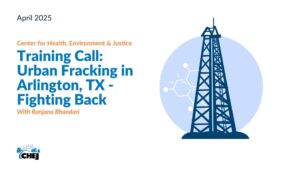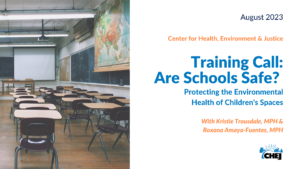May 2025

CHEJ's "All In" - Spotlight of the Month
April was a month of both celebration and forward motion for environmental justice. The month kicked off with Earth Day, and this year’s theme rang loud and clear: no environmental solution is complete without justice. From coast to coast, Earth Day events highlighted the work being done in underserved communities – urban tree plantings in formerly redlined neighborhoods, clean-ups of rivers that run past public housing, solar panel installations for low-income households – underscoring that climate action and environmental repair must benefit everyone. In Washington D.C., the Biden-Harris Administration released its annual Environmental Justice Scorecard update, detailing how over $600 billion in federal investments are now being directed to disadvantaged communities under various programs.
This report showed tangible results: hundreds of water infrastructure projects in Appalachian and rural towns, Superfund cleanups accelerated in predominantly minority areas, new electric school buses rolling out to reduce kids’ exposure to diesel exhaust. It’s evidence that policies like the Justice40 Initiative are not just promises on paper – they’re delivering real improvements in people’s lives. Meanwhile, grassroots groups kept the pressure on to ensure those dollars are spent where most needed. In New York, advocates marked Earth Day by pushing state officials to implement a newly passed law requiring 35-40% of climate funds go to frontline communities, mirroring the federal Justice40 commitment. And on the West Coast, activists used Earth Day to launch a campaign for cleaner port operations to help neighborhoods plagued by diesel pollution. All told, April’s activities carried a hopeful message: after decades of inequality, resources and attention are finally flowing to the communities that have borne the brunt of pollution. There is much work ahead, but this infusion of investment – and the community oversight that accompanies it – is a game changer worth celebrating.
Can Art and Culture Make a Difference?

Ken Grossinger, longtime movement strategist and author of Art Works: How Organizers and Artists are Creating a Better World Together, argues that in the face of rising authoritarianism and legal attacks on activism, true power lies in uniting cultural expression with community organizing to inspire change, shift narratives, and ignite the emotional drive behind lasting social movements.
Read Ken’s latest blog entry and be sure to pickup a copy of Art Works: How Organizers and Artists are Creating a Better World Together by visiting www.artworksbook.com
Toxic Tuesday
Carbon disulfide is a colorless liquid chemical that readily evaporates at room temperature. It occurs naturally during composting and volcanic eruptions, but most carbon disulfide is… [Read more]
Hydraulic fracturing (commonly known as fracking) is a technique that uses pressurized liquid to fracture bedrock in order to the extract the oil or gas inside. Materials in the fracking fluid keep… [Read more]
Training Calls

Liveable Arlington is a grassroots environmental advocacy organization in the Barnett shale city of Arlington, Texas. Arlington is an egregious example of “urban drilling” – where the city permits multi-well fracking sites to extract methane/fossil gas right next to homes and daycares. Emissions from these sites accelerate climate breakdown, and also cause severe health issues for our frontline community.
Learn about our advocacy for intergenerational, climate and environmental justice, our past successes, and current challenges, and hear from impacted community members via a short film.
…. [Watch now]
Backyard Talk Blogs
By Ben Chisam. On January 16, 2025, a fire broke out in Moss Landing, California at the world’s largest lithium-ion battery storage facility. The fire burned for several days, and 1,200 residents were temporarily evacuated. While this was the fourth fire at the… [Read more]
By Ken Grossinger. Strongmen all want the same thing. They want us to feel powerless. When we feel we don’t make a difference, that’s when they win. But long before Trump, Musk, and their sycophants began to demean and attack environmental… [Read more]
By Juliet Porter. At the start of April, devastating storms swept across parts of the Midwest and Southeastern United States, bringing tornadoes, violent winds, and catastrophic flooding. Millions of Americans were affected as rivers overflowed… [Read more]
By Leila Waid. A recently published systematic review article analyzed effective methods for increasing heat literacy. A systematic review summarizes the current scientific literature by synthesizing multiple studies and providing the lessons learned. In this case… [Read more]
Every day, people facing threats to their health and environment call CHEJ for help. They are looking for proof that all landfills leak, health studies linking incinerators to cancer, or the environmental record of a… [Read more]
Do you find this information useful? Please consider pitching in and making a contribution to CHEJ. We appreciate your support!
This Earth Day season reminded us why CHEJ’s work is so important – and so effective. By partnering scientific evidence with community organizing, we’ve helped make the case that everybody deserves a healthy environment, and those with the greatest needs must be first in line for help. We’re thrilled to see billions of dollars earmarked for environmental justice, but we know dollars alone don’t solve problems. They need to be coupled with community know-how, transparency, and advocacy to ensure they hit the mark. That’s where CHEJ comes in. Your support enables us to guide local leaders on how to secure and deploy these funds – whether it’s grant-writing assistance, technical training to monitor improvements, or convening coalitions to keep officials accountable. With your donation, you become a crucial part of this follow-through. You help us turn funding opportunities into success stories on the ground: clean pipes in a town with contaminated water, air filters in a school near a highway, or a long-neglected toxic site finally getting cleaned up right. The spring of 2025 has brought new reasons for hope. Let’s nurture that hope by investing in the organizations like CHEJ that will see this process through, ensuring that promises made translate into healthier, greener, and more just communities for generations to come. Please consider making a donation today to continue this vital work.
Thank you, your support is greatly appreciated!








